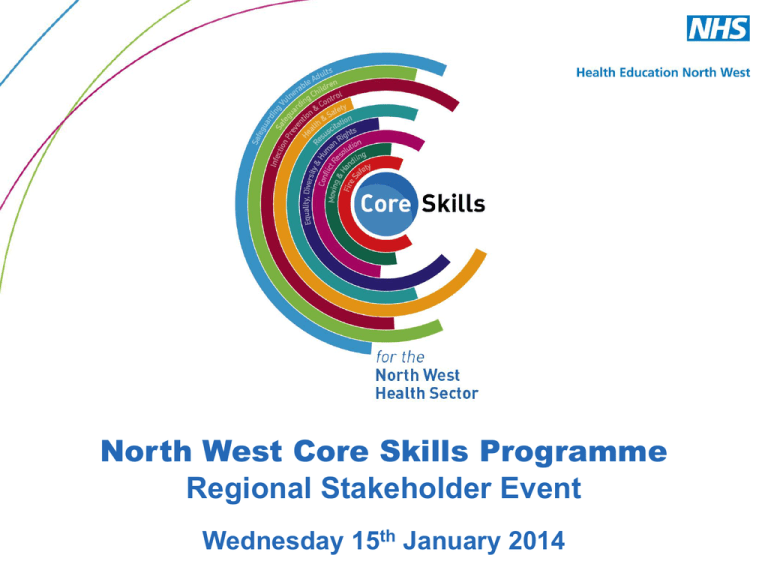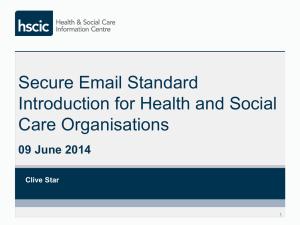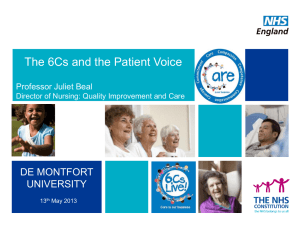Core Skills Leads Event - North West Integrated Workforce Unit
advertisement

North West Core Skills Programme Regional Stakeholder Event Wednesday 15th January 2014 Core Skills Stakeholder Event – 15th January 2014 09:00 - Registration 09:30 - Welcome - New Developments - Core Skills Working in Practice - Where’s your Organisation up to? 10:40 - Refreshments 11:00 - Maximising the Existing Systems - The Potential of Assessment - Where Next? – Future Priorities - Questions & Closing Remarks 12:30 - Lunch Welcome Professor Ged Byrne Director of Education and Quality Health Education North West Welcome & Context for today HE NW gives full backing and support to the North West Core Skills Programme and its progress Core Skills needs to be seen as generic across the NW Fundamental to patient care and reducing risk Continuation of Education - ‘Cradle to Grave’ starts with the Core Skills Follow you through your lifetime in the NHS Student – Post Grad – Wider Workforce – CPD We can’t wait – Needs to Happen NOW! Congratulations The programme has already received the recognition of winning the HSJ Efficiency Award Now it has been made a finalist for the national Lean Healthcare Awards 2014 for Improving Services through Training & Development Winner to be announced 6th February 2014 New Developments Seán Bradbury NW Core Skills Programme Manager NW Integrated Workforce Unit Nick Stafford Skills for Health & NW Core Skills Programme New Developments Education Materials PARE Information Sharing Protocol Agreement Core Skills Register v1.2 National Progress Core Skills Education Materials Version 2.0 aligned to the UK Core Skills Framework Developed with: SMEs in the NW Liverpool John Moores University Moseley Multimedia Materials Available: Powerpoint Presentation Trainer / Facilitator Notes Reader / Workbook Assessment eLearning Core Skills Education Materials Enhancements: Information Governance added Increased Question Bank Randomised Questions Reader / workbook included Outcomes linked to content Compatible with Mobile Devices Core Skills Education Materials Available On: Equality, Diversity & Human Rights NLMS HE COOP Fire Safety NLMS HE COOP Health, Safety & Welfare NLMS HE COOP Moving & Handling NLMS HE COOP Infection Prevention & Control NLMS HE COOP Information Governance NLMS HE COOP Safeguarding Adults NLMS HE COOP Safeguarding Children NLMS HE COOP Conflict Resolution 24 / 01 / 2014 Resuscitation (Adult & Child) 31 / 01 / 2014 CSR & PARE Project PARE = Practice Assessment Record & Evaluation HE COOP LMS Training Data HEI / FE College Core Skills Register PARE Project Placement Data NHS Trust ISPA Update Reviewed in October / November 2013 Feedback / queries from a number of organisations C&M Information Governance Forum consulted Updated version finalised in December 2013 and to be released in January 2014 Additions include: Breach & Escalation Process Privacy Impact Assessment Appendices Updated Partner Organisations Added Your organisation needs to sign the ISPA before you can access the Core Skills Register Core Skills Register v1.2 v1.1 Platform upgrade Access Control enhancements Penetration Testing (PIA) v1.2 Priority enhancements following pilot Roadmap for further enhancements and scalability = v2.0 Sector Skills Councils England Scotland Northern Ireland Wales Health NHS Acute Foundation Mental Health Provider Specialist Etc Independent Contractors Related Voluntary Dental Practices HEI & FEI Health Programmes Hospices General Practices MOD Health Macmillan Optometrists Prison Health Marie Curie Pharmacies Social Care (Health) Etc Etc Etc UK Core Skills Training Framework Independent Providers Bupa Care UK Spire Outsourced services Etc CSTF Registrations North West 26 8 If not done already, need to ensure your organisation has registered for the UK Core Skills Training Framework CSTF Declarations North West* 35 * The NWCSP has submitted all Core Skills Alignment Declarations it has received to Skills for Health this month If not done already, need to ensure your organisation has submitted its Declaration to the NWCSP Core Skills in Practice Tim Grocott Junior Doctor Project Manager NW Core Skills Programme Mark Burke Future Workforce Project Manager NW Core Skills Programme Core Skills Working in Practice Junior Doctor Mandatory Training Passport Project • Work stream Update • Case Study • Examples Future Workforce Project • Work stream update • Case Study • Examples Junior Doctor Mandatory Training Passport Project North Western Deanery • Aligned to NW Framework – UK Mapping Completed • Core Skills Register data alignment – Completed Mersey Deanery • Aligned to NW Framework – UK Mapping Completed • Core Skills Register data alignment – Completed Mersey Deanery Existing Passport model in operation (WIT System) Integrated with programme work Next steps: • Pilot the maintenance of placement information & learner records on the Core Skills Register • Launch the Shared Training Service hosted by StHK: aiming to assess the benefits of a shared service model Mersey Deanery CORE SKILLS REGISTER Learning Records Personal Details Organisational Links North Western Deanery Central E-Learning Platform (E-Induction – Foundation Only) • Integrated into specialty Inductions - August 2013 pilot • Integrated into specialty Inductions - February 2014 Next steps: - • Final process/procedural refinements • To embed as Business As Usual this year North West Footprint NORTH WEST CORE SKILLS REGISTER Learning Records Personal Details Organisational Links Case Studies • Central Manchester University Hospitals • University Hospital South Manchester Central Manchester University Hospitals 400 Junior Doctor Placements One Central E-Learning System An organisation with Multiple sites Taken part in 2 pilot phases Historically achieved 80% + JD compliance Central Manchester University Hospitals Project Implementation: E-Learning duplication exercise undertaken Induction timetable & subject matter expert consultation New processes in place monitoring compliance Junior Doctor survey strongly supportive of this approach Efficiency: 2 hours 40 minutes per Junior Doctor 49% JDs CSF Compliant BEFORE rotation UHSM 235 Junior Doctor Placements Face to face & E-Learning induction combined Taken part 2 pilot phases Historically achieved 65% JD Compliance UHSM Organisation specific information available (duplication review) Induction timetable & subject matter expert consultation New processes in place monitoring compliance Efficiency: 3 hours 30 minutes per Junior Doctor 57% JDs CSF Compliant BEFORE rotation Case Study Summary • Evidence the proposed Passport model is feasible • Junior Doctor • Administrative/Management perspective • Forecast: 85% • 12’411 learning records (1’773 JDs) Case Study Summary Success • Core Skills Register crucial (accuracy/timings) • Enhancements • Evolve • Lead Employer has a vital role to play Trust August Compliance February Compliance FIVE BOROUGHS 92% TBC – Est Aug – 85% BLACKPOOL NA 33% BOLTON 86% 61% CENTRAL MANCHESTER 60% 49% EAST LANCASHIRE 87% 66% LANCASHIRE TEACHING HOSPITALS NA 53% PENNINE ACUTE NA 29% SALFORD ROYAL NA 38% STOCKPORT 38% 33% TAMESIDE 71% 41% THE CHRISTIE 30% 34% SOUTH MANCHESTER 78% 57% MORECAMBE BAY 90% 72% WRIGHTINGTON 62% 41% Case Study Summary “Having moved 3 times in one year and having to complete 3 lots of training is not an efficient use of my skills or time” “Please don't keep repeating induction at every rotation, it creates a workload on the staff grades at the new hospital and delayed patient care” “Please strip this down to the bare minimum so we can spend induction actually doing useful things that will have a direct influence on our daily clinical work” “Good idea, not quite working yet” Future Workforce HEI Current Position HEIs (10 in the NW, delivering 77 Programmes) All 10 have at least 1 programme Core Skills aligned 67 % programmes aligned (52 out of 77) 7 HEIs submitted Core Skills Alignment Declaration 40 % programmes aligned Declared (31 out of 77) 3 HEIs Aligned and Declared for all their programmes Data Validation with 4 HEIs Data transferable between HEI Systems & CSR Future Workforce HEI Next Steps Complete validation of data with HEIs Upload data onto Core Skills Register 2000+ students to be on CSR by end of January Training Data already being uploaded Need to capture Placement Data Data Validation – working with 4 HEIs Continue work with trusts on preparation for placement intakes FE Student Journey NW Skills Academy Academic Training FE College Vocational Training Core Skills Register NHS / Non NHS Future Workforce FE Current Position 17 FE Colleges (Cadets and other Health related learning) 65 % of Colleges Core Skills aligned (11 out of 17) 41 % of Colleges submitted Core Skills Declaration (7 out of 17) 17 Colleges are working towards alignment 9 Colleges using the HE COOP platform HE Coop hosts the latest Core Skills education materials Acknowledged that colleges will deliver Core Skills to their wider health care students Future Workforce FE Next Steps 50% of FE Colleges will have students undertaking Core Skill training via the HE COOP by end January Confirm UK alignment with none HE COOP users Validate FE data before upload to CSR Future Workforce What’s happening NOW University of Salford: Are using the HE COOP platform 700 students have completed Core Skills training Across 11 Healthcare Programmes Students on placement with 34 providers Salford Student Placement Providers Future Workforce What’s happening NOW Greater Manchester West Mental Health NHS FT: Receive 200+ students on placement from Salford Students on placement NOW Aware of Core Skills training received by students Modified Induction to accommodate students Agreed protocol with Salford to manage by exception CSR to be introduced to streamline and automate process Where’s your Organisation up to? Seán Bradbury NW Core Skills Programme Manager NW Integrated Workforce Unit Where’s your Organisation up to? Progress against Implementation Model Dashboards Alignment Declaration ISPA Acceptance of External Training Progress against Implementation Model Phases Step 1 Step 2 Step 3 Step 4 Step 5 Phase 1 Engagement Exec Support Core Skills Lead Project Meeting Assess Readiness Action Plan Phase 2 Alignment Engage SMEs Complete Content Mapping Tool Ensure Content is Aligned Sign off By Organisation Submit Evidence to NWCSP Phase 3 Share Data Sign Info Sharing Protocol Data Reporting In Place Process for Sharing Core Skills Skills Register Go Live with Admin/ Core Skills Training Register Phase 4 Recognition Agree to Accept Training Introduce Check for Compliance Introduce Flexible Training Sign off by Organisation Submit Evidence to NWCSP Phase 5 Realisation Embed Measure Audit Business As Usual Continuous Improvement Progress against Implementation Model Phases Step 1 Step 2 Step 3 Step 4 Step 5 Phase 1 Engagement 97 % 97 % 97 % 97 % 97 % Phase 2 Alignment 97 % 87 % 62 % 54 % 54 % Phase 3 Share Data 63 % 43 % 40 % 15 % 15 % Phase 4 Recognition 71 % 14 % 14 % 15 % 15 % Phase 5 Realisation 0% 0% 0% 0% 0% Dashboards NHS Organisations HEIs FE Colleges Core Skills Alignment Declaration 21 NHS Trusts (54%) have submitted Declarations (291 out of 387 subjects aligned – 75%) 7 HEIs (70%) have submitted Declarations (31 out of 77 programmes aligned – 40%) 7 FE Colleges (41%) have submitted Declarations 35 Organisations in NW have submitted Declarations More than any other region ISPA & Recognition of Training 25 NHS Trusts (63%) have signed the ISPA 6 HEIs (60%) have signed the ISPA 4 FE Colleges (24%) have signed the ISPA 28 NHS Trusts (71%) have agreed to recognise training No data for HEIs or FE Colleges Key Metrics Current Position Target –Mar 2014 97% 100% Number of NHS organisations in the NW CSF Aligned 54% 75% Number of Healthcare Programmes in the NW working towards Alignment 100% 100% Number of Healthcare Programmes in the NW Aligned 40% (68%) 75% Number of organisations committed to recognise external Core Skills aligned training 71% 50% Estimated level of duplication avoided TBC 50% Level of engagement of organisations in the NW in supporting developments TBC 75% Key Activity Numbers of NHS Organisations in the NW Key Activity working towards Alignment Break & Networking Core Skills Stakeholder Event – 15th January 2014 09:00 - Registration 09:30 - Welcome - New Developments - Core Skills Working in Practice - Where’s your Organisation up to? 10:40 - Refreshments 11:00 - Maximising the Existing Systems - The Potential of Assessment - Where Next? – Future Priorities - Questions & Closing Remarks 12:30 - Lunch Maximising the Existing Systems Lee Holmes Chair of the NW OLM SIG Lancashire Care NHS Foundation Trust Nick Stafford Skills for Health & NW Core Skills Programme Implementation Model Readiness Realisation Implementation Recognition Share Data Alignment Engagement Phase 3 – Share Data Enabling Core Skills Training Data to be Shared with other Organisations Step 5: Go Live Step 1: Sign Info Sharing Protocol Step 2: Data Reporting In Place Step 3: Process for Sharing Core Skills Step 4: Skills Passport Admin & Training Sector Skills Councils England Scotland Northern Ireland Wales Health Care & Development Leisure NHS Etc Acute Foundation Mental Health Provider Specialist Etc Independent Contractors Related Voluntary Dental Practices HEI & FEI Health Programmes Hospices General Practices MOD Health Macmillan Optometrists Prison Health Marie Curie Pharmacies Social Care (Health) Etc Etc Etc UK Core Skills Training Framework Independent Providers Bupa Care UK Spire Outsourced services Etc Sector Skills Councils England Scotland Northern Ireland Wales Health Care & Development Leisure NHS Etc Independent Contractors Related Voluntary Independent Providers HEI & FEI Health Programmes Acute Bupa Use existing Management Systems DentalLearning Practices Hospices Foundation Care UK MOD Health General Practices Macmillan withHealth CSTF Optometrists minimum data set Mental Spire Prison Health Marie Curie Provider Specialist LMS HR HR Etc Pharmacies LMS HR Etc HR Social Care LMS (Health) HR HR Etc Etc LMS HR HR UK Core Skills Training Framework Outsourced services LMS HR HR Etc Sector Skills Councils England Scotland Northern Ireland Wales Health Care & Development Leisure NHS Etc Independent Contractors Related Voluntary Independent Providers HEI & FEI Health Programmes Acute Bupa Use existing Management Systems DentalLearning Practices Hospices Foundation Care UK MOD Health General Practices Macmillan withHealth CSTF Optometrists minimum data set Mental Spire Prison Health Marie Curie Provider Specialist LMS HR HR Etc Pharmacies LMS HR Etc HR Social Care LMS (Health) HR HR Etc Etc LMS HR HR UK Core Skills Training Framework Outsourced services LMS HR HR Etc Phase 3 – Share Data Enabling Core Skills Training Data to be Shared with other Organisations Step 5: Go Live Step 1: Sign Info Sharing Protocol Step 2: Data Reporting In Place Step 3: Process for Sharing Core Skills Step 4: Skills Passport Admin & Training Sector Skills Councils England Scotland Northern Ireland Wales Health Care & Development Leisure NHS Etc Acute Foundation Mental Health Provider Specialist LMS HR HR Etc Independent Contractors Related Voluntary Dental Practices HEI & FEI Health Programmes Hospices General Practices MOD Health Macmillan Optometrists Prison Health Marie Curie Pharmacies Social Care LMS (Health) HR Etc LMS HR Etc HR HR Etc Core Skills Register LMS HR HR Independent Providers Bupa Care UK Spire Outsourced services LMS HR HR Etc Core Skills Codes & Naming Conventions FS 01 01 A 2 = Fire Safety • Course Name • Level • Version Number • Assessed (A) / Non-Assessed (N) • Refresher period (in years) Subject Course Level Version Assessed Refresher Example Fire Safety FS 01 02 A/N 2 FS0102N2 Moving & Handling MH 01 / 02 02 A/N 3 (Level 1) 1 (Level 2) MH0202A1 Conflict Resolution CR 01 02 A/N 3 CR0102A3 Equality, Diversity & Human Rights ED 01 02 A/N 3 ED0102A3 Resuscitation RE 01 02 A/N 0 RE0102N0 Resuscitation Adult RA 02 / 03 02 A/N 1 RA0202A1 Resuscitation Paed RP 02 / 03 02 A/N 1 RP0302A1 Resuscitation Newborn RN 02 / 03 02 A/N 1 RN0202A1 Health, Safety & Welfare HS 01 02 A/N 3 HS0102A3 Infection Prevention and Control IP 01 / 02 02 A/N 3 (Level 1) 1 (Level 2) IP0102A3 Safeguarding Children SC 01 / 02 / 03 02 A/N 3 SC0202A3 Safeguarding Adults SA 01 02 A/N 3 SA0102A3 Information Governance IG 01 02 A/N 1 IG0102A2 Core Skills National Competences Allows Core Skills to move and be accredited within ESR and the IAT process Supports movement of the wider workforce and between NHS organisations Developed by National ESR Team and available NOW Use of competences audited by Skills for Health Need to follow a set process before can use Process for National Competences 1. Complete Core Skills Mapping 2. Submit to NWCSP Core Skills Declaration 3. Recorded on Skills for Health Organisation List 4. Confirmation from NWCSP on which competences you can use www.skillsforhealth.org.uk eLearning and OLM All the new Version 2.0 Core Skills Education Materials to be available on the NLMS The materials are UK aligned, therefore you can attach the national competencies to them (once declaration submitted) eLearning support to be maintained with the existing arrangements CSR and ESR Shared Training Centre STHK as Lead Employer set up Shared Training Centre for Mersey Deanery Junior Doctors with own VPD 11 out of 21 organisations part of the Shared Training Centre STHK trialling combined use of Shared Training Centre and Core Skills Register for Junior Doctors Collective Benefits: Shared Training Centre allows training to be recorded in one central place for all rotation organisations Core Skills Register allows rotation organisations to see completed Core Skills training earlier Going Forward Encourage Organisations using ESR & OLM to use the Core Skills National Competences declare Continue to work with the NWCSP Next OLM SIG is on the 28th January 2014 Contact Details Lee Holmes Learning Systems Manager e-mail: Lee.Holmes@lancashirecare.nhs.uk Tel: 07432 610001 The Potential of Assessment Assessment – anticipate a increasing focus and expectation ‘It is possible for staff to be “trained” and for the training to have no effect’ (Skills for Health Unpublished) Expectations: General movement focusing on outcome and impact Accountability: Organisational Assurance and Personal achievement Recognition: Enable recognition and accreditation Promote Improvement: Teaching and Learning and practice Characteristics of Assessment • Linked to assessable educational aims and outcomes • Transparent • Focus on impact and improvement • Comprehensive and multifaceted • Motivational • Promote reflection and further learning • Generates meaningful data which is Reliable and Valid Assessment Dimensions What are we seeking to Assess When to Assess • Prior/Programme Entry • Knowledge • Skills • Values and Attitude • Behaviours • Key transition points during learning process • Programme completion / Exit • Follow Up E-assessment Project Seeking to deliver • Assessment framework for UK Core Skills Framework • Start of a question bank of Multiple Choice Questions related to each of the Core Skills Framework • Standardised Paper based assessment for local use and adaptation • An e-assessment version • Template for scenario based assessment Workshop 1 Workshop Task: The greater use of Pre assessment for Core Skills knowledge and understanding would help promote learner motivation and reduce unnecessary duplication. Workshop Question What common processes/arrangements do we need to put in place to support confidence and effective use of pre-assessment? Think about, What, Why and How Time: 25mins Where Next - What are the Future Priorities Thinking about Priorities Subjects Which, Why & What is already available System and Processes Groups Who next and When What is required for further efficiency & confidence Workshop 2 Workshop: 3 Tasks Time: 30minutes 1). Review the proposed subjects: • What is the level of agreement for their priority and wider relevance. Identify any related local developments that could be used as a ‘starter for 10’. 2). Who Next? • Which staff group(s) should be next priority for rollout of CSF and why? 3). System and Processes: • Are there any additional system/processes needed to support delivery and achieve benefits? If so identify one and write a brief description of the requirement. Proposed Subjects that might be included in a Clinical Skills Framework Standards • Clinical Governance • Clinical Health records keeping Venesection • IV Cannulation/Venepuncture • Aspects of Blood Sampling and Transfusion Process and Safety Drugs • Medicines management Clinical Risk/Assessment • • • • Acting in Medical Emergencies/Care of the deteoriating patient Use of Early Warning Scores Respiratory Care (Airway Management and interventions) Venous Thrombo-embolism/ Wound Management • • • Aseptic Non touch technique Basic Wound Management Pressure ulcer care Communication • Mental Capacity • Consent • Dementia Care • Breaking bad news • Care of the Dying Questions & Closing Remarks Lunch & Networking








